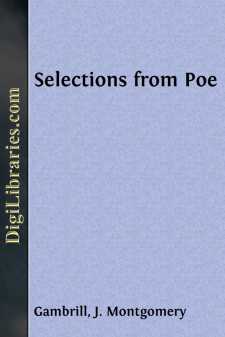Categories
- Antiques & Collectibles 13
- Architecture 36
- Art 48
- Bibles 22
- Biography & Autobiography 813
- Body, Mind & Spirit 142
- Business & Economics 28
- Children's Books 17
- Children's Fiction 14
- Computers 4
- Cooking 94
- Crafts & Hobbies 4
- Drama 346
- Education 46
- Family & Relationships 57
- Fiction 11829
- Games 19
- Gardening 17
- Health & Fitness 34
- History 1377
- House & Home 1
- Humor 147
- Juvenile Fiction 1873
- Juvenile Nonfiction 202
- Language Arts & Disciplines 88
- Law 16
- Literary Collections 686
- Literary Criticism 179
- Mathematics 13
- Medical 41
- Music 40
- Nature 179
- Non-Classifiable 1768
- Performing Arts 7
- Periodicals 1453
- Philosophy 64
- Photography 2
- Poetry 896
- Political Science 203
- Psychology 42
- Reference 154
- Religion 513
- Science 126
- Self-Help 84
- Social Science 81
- Sports & Recreation 34
- Study Aids 3
- Technology & Engineering 59
- Transportation 23
- Travel 463
- True Crime 29
Selections from Poe
Description:
Excerpt
INTRODUCTION
EDGAR ALLAN POE: HIS LIFE, CHARACTER, AND ART
Edgar Allan Poe is in many respects the most fascinating figure in American literature. His life, touched by the extremes of fortune, was on the whole more unhappy than that of any other of our prominent men of letters. His character was strangely complex, and was the subject of misunderstanding during his life and of heated dispute after his death; his writings were long neglected or disparaged at home, while accepted abroad as our greatest literary achievement. Now, after more than half a century has elapsed since his death, careful biographers have furnished a tolerably full account of the real facts about his life; a fairly accurate idea of his character is winning general acceptance; and the name of Edgar Allan Poe has been conceded a place among the two or three greatest in our literature.
LIFE AND CHARACTER
In December, 1811, a well-known actress of the time died in Richmond, leaving destitute three little children, the eldest but four years of age. This mother, who was Elizabeth (Arnold) Poe, daughter of an English actress, had suffered from ill health for several years and had long found the struggle for existence difficult. Her husband, David Poe, probably died before her; he was a son of General David Poe, a Revolutionary veteran of Baltimore, and had left his home and law books for the stage several years before his marriage. The second of the three children, born January 19, 1809, in Boston, where his parents happened to be playing at the time, was Edgar Poe, the future poet and story-writer. The little Edgar was adopted by the wife of Mr. John Allan, a well-to-do Scotch merchant of the city, who later became wealthy, and the boy was thereafter known as Edgar Allan Poe. He was a beautiful and precocious child, who at six years of age could read, draw, dance, and declaim the best poetry with fine effect and appreciation; report says, also, that he had been taught to stand on a chair and pledge Mr. Allan's guests in a glass of wine with "roguish grace."
In 1815 Mr. Allan went to England, where he remained five years. Edgar was placed in an old English school in the suburbs of London, among historic, literary, and antiquarian associations, and possibly was taken to the Continent by his foster parents at vacation seasons. The English residence and the sea voyages left deep impressions on the boy's sensitive nature. Returning to Richmond, he was prepared in good schools for the University of Virginia, which he entered at the age of seventeen, pursuing studies in ancient and modern languages and literatures. During this youthful period he was already developing a striking and peculiar personality. He was brilliant, if not industrious, as a student, leaving the University with highest honors in Latin and French; he was quick and nervous in his movements and greatly excelled in athletics, especially in swimming; in character, he was reserved, solitary, sensitive, and given to lonely reverie. Some of his aristocratic playmates remembered to his discredit that he was the child of strolling players, and their attitude helped to add a strain of defiance to an already intensely proud nature....


